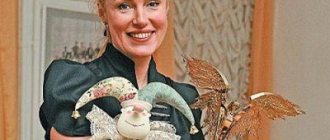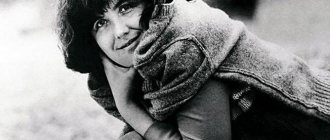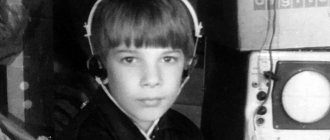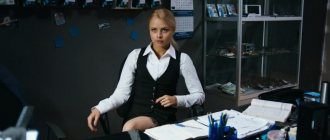Biography
Pyotr Efimovich Todorovsky was born in the Ukrainian outback, into a poor Jewish family. “My childhood was terrible. We suffered the famine of 1933 very hard. My older brother and sister and I walked through the barns and looked for used brooms, washed them until they were white, chopped them finely and cooked soup,” the director recalled.
But this was not the only test fate had in store. At the beginning of the Great Patriotic War, the Todorovsky family was evacuated to Stalingrad. Here sixteen-year-old Petya, who had not yet graduated from school, worked with his father unloading coal at a power plant.
At the end of 1941, due to a shift in the front line, we had to move again. This time to the Saratov region (Peschaty Mar village). In 1943, the young man entered the Saratov Military School. And in a matter of months he was sent as a commander of a mortar platoon to Belarus. So Peter found himself on the front line, taking part in several military operations, including the capture of Berlin. He reached the Elbe and from there was discharged due to injury.
In the post-war years he served in the Pesochnoye garrison near Kostroma. In 1949, he retired to the reserves and worked for some time at a glass container factory, while completing his studies at evening school.
All these difficult years, the young man dreamed of making films. Pyotr Todorovsky fell in love with his future profession at the front, he was captivated by the work of military operators, and he made a wish - he would stay alive, he would definitely master this craft.
In 1949, Todorovsky entered the camera department of VGIK, in the workshop of Boris Volchek.
Awards and titles
Russian President Vladimir Putin presents Pyotr Todorovsky with the Order of Merit for the Fatherland, 2000
- Honorary title “Honored Artist of the Ukrainian SSR” (1967)
- Honorary title "People's Artist of the RSFSR" (August 23, 1985) - for services to the development of Soviet cinema
[15] - State Prize of the Russian Federation in the field of literature and art in 1995 (May 27, 1996) - for the embodiment of humanistic ideals in feature films of recent years
[16] - Order of Merit for the Fatherland, II degree (December 31, 2005) - for outstanding contribution to the development of Russian cinema and many years of creative activity
[17] - Order of Merit for the Fatherland, III degree (August 26, 2000) - for great personal contribution to the development of cinema
[18] - Order of Merit for the Fatherland, IV degree (August 11, 1995) - for services to the state and successes achieved in work, a great contribution to strengthening friendship and cooperation between peoples
[19] - Order of the Red Banner of Labor
- Order of the Badge of Honor (November 24, 1960) - recognizing outstanding services in the development of Soviet literature and art and in connection with the decade of Ukrainian literature and art in the city.
Moscow [20] - Order of the Patriotic War, 1st degree (May 7, 1945) - for exemplary performance of combat missions of the command on the front of the fight against the German invaders and the valor and courage shown
[21] - Order of the Patriotic War, 1st degree (February 21, 1987) - for bravery, fortitude and courage shown in the fight against the Nazi invaders, and in commemoration of the 40th anniversary of the victory of the Soviet people in the Great Patriotic War of 1941-1945
[22] - Order of the Patriotic War, II degree (March 20, 1945) - for exemplary performance of combat missions of the command on the front of the fight against the German invaders and the valor and courage shown
[23] - Medal "For the Capture of Berlin" (1945)
- Medal "For the Liberation of Warsaw" (1945)
- Gratitude of the President of the Russian Federation (July 11, 1996) - for active participation in the organization and conduct of the election campaign of the President of the Russian Federation in 1996
[24] - Special Prize of the President of the Russian Federation “For outstanding contribution to the development of Russian cinema” (June 12, 2000)[25].
Operator
After graduating from the institute, he made his debut as a cameraman at the Chisinau film studio of newsreels and documentaries. He took part in the filming of the musical film “Moldavian Tunes”. Then he worked for about ten years as a cameraman at the famous Odessa film studio, where he was invited by Marlen Khutsiev to create “Spring on Zarechnaya Street.” Two years later, the film “Two Fedoras” was released in the same tandem.
In Odessa, the future director, through a camera lens, watched the work of future masters, such as: Evgeny Tashkov (“Thirst”), Viktor Zhilin (“My Daughter”), Marlen Khutsiev. And already in 1962, co-directing with Vladimir Dyachenko, he made his first film. After this picture, Pyotr Todorovsky became a director, screenwriter and composer of his own films.
Prizes at film festivals
- Laureate of the All-Union Film Festival in the category “Second Prize for Cinematography” (1960)
- Prize for Best Debut at the 26th Venice Film Festival (film "Loyalty") (1965)
- Nika Award in the category “Best Feature Film” (“Anchor, more anchor!”) (1992)
- Main prize of the “Grand Competition” of the Kinotavr film festival (1993)
- Prize for Best Director (“What a Wonderful Game”) at the Kinoshock Film Festival (1995)
- Golden Aries Award (“What a Wonderful Game”) (1995)
- Nika Award in the category “Honor and Dignity” (2003)
Director and screenwriter
Pyotr Efimovich’s first independent directorial work, the military melodrama “Loyalty” with Vladimir Chetverikov and Galina Polskikh, received the Venice Prize.
"Magician"
The drama “The Magician” with Zinovy Gerdt and Evgeny Leonov is especially dear to its creator: “This is one of my favorite works. This is a script by the wonderful playwright Alexander Volodin. For me it was a great success and at the same time a very strange scenario. This is a parable about an eccentric magician who was ready to give up all the blessings in life in order to preserve himself as an individual. So as not to sully your life line.”
Later there were: melodrama “City Romance” about the love of a young doctor and a teacher training school student, film adaptations of classics - “One’s Own Land” (based on the story “Fatherless” by F. Abramov), “The Last Victim” (based on the play of the same name by A.N. Ostrovsky), drama “On the Day of the Holiday” about the fate of a former front-line soldier.
“The beloved woman of mechanic Gavrilov”
In 1981, Mosfilm released one of the bestsellers of the 80s - the melodrama “The Beloved Woman of Mechanic Gavrilov.” The director invited stars of Soviet cinema - Lyudmila Gurchenko and Sergei Shakurov - to play the main roles.
A long day in the life of 38-year-old Margarita Sergeevna began with the fact that her beloved man, mechanic Gavrilov, did not show up at the registry office. Margarita waits for Gavrilov, suffers, hopes and becomes a witness and participant in many funny and sad stories.
The picture is woven from short stories, permeated with unexpected comedic solutions, vigilantly noticed by everyday details. It also has a kind of climax - the silent finale of the heroine's explanation with the mechanic Garilov, who, despite his presence in the film's title, appears on the screen only at the very end.
"War Romance"
Two years later, Pyotr Todorovsky began creating the famous A Romance of War, which was later nominated for an Oscar for Best Foreign Language Film.
Plot: Just before the start of the fighting, a young soldier fell in love with a beauty living with a magnificent and heroic battalion commander. The war, through which the soldier carried his love as a symbol of beauty, peace, his youth and purity, is over. Sasha (Nikolai Burlyaev) meets Lyuba Antipova (Natalia Andreichenko) after the war, selling pies at the Central Department Store, and the old feeling flares up in him, despite the fact that he is married to a teacher (Inna Churikova), sweet and very intelligent.
The whole film is a piercing cry that returning from the war was even more difficult than fighting. It was precisely the return to normal life that broke so many people. The director clarifies: “At the front you could be a queen, like Andreichenko’s heroine, and after the war you were forced to sell pies. It was the worst and saddest thing. They organized magnificent parades, gave out orders, gave receptions, and the crippled lived in the markets.”
After the war drama, Todorovsky turned to the genre of tragicomedy - he made the film “Along the Main Street with an Orchestra.” This is a touching story of the relationship between a modest teacher Vasily Pavlovich and his adult daughter Ksenia, who unexpectedly discover each other’s inner world. The film featured: Oleg Borisov, Lydia Fedoseeva-Shukshina, Marina Zudina, Valentin Gaft, Igor Kostolevsky, Valentina Telichkina, Oleg Menshikov, Lyudmila Maksakova, Alexander Lazarev (senior), Svetlana Nemolyaeva.
"Intergirl"
At the end of the 80s, one of the best films by Pyotr Todorovsky, Intergirl, was released, which became the first domestic cinematic work on a similar topic. The film was based on the story of the same name by Vladimir Kunin, was a resounding success and received many awards at prestigious film festivals.
The director says about the creation of the drama: “When I started working, I thought: why am I taking on this script when I don’t know anything about these women. How, why did they leave for this life, why did they become prostitutes? And they began to bring me Moscow women of this order to Mosfilm, and they told me with great pleasure and in detail about their lives...
Everyone was waiting for the “strawberry”, everyone was expecting that there would be a lot of erotic scenes. And I wanted to make a film about the difficult fate of a young woman who could not realize herself in the Soviet Union.”
Many domestic stars auditioned for the role of the main character, Tatyana, but Pyotr Efimovich chose Elena Yakovleva: “Lena was approved with great difficulty. There was a false idea that a prostitute should be a beauty with rounded shapes, a sex bomb. When they brought me a thin girl in a strange hat, who modestly sat down on a chair and twisted her legs in a figure eight, I was perplexed. Who is this? Undress her - there are only bones! But already from the first or second rehearsal I realized that it was Tanka. Lena Yakovleva is a subtle actress, she got excited at half a turn, suggested, absorbed into herself. Even as a woman, she understood some things more than me, which only benefited the film.”
“Anchor, more anchor!”
The sensational melodrama “Anchor, more anchor!” added prestigious cinematic awards to the director's collection. Comedy drama about the life of a small provincial garrison. The action takes place after the war - everything is in plain sight: family quarrels, love, death, betrayal, human meanness and cowardice. This is a film about people who won the war.
And again, the film featured a stunning ensemble of actors: Valentin Gaft, Irina Rozanova, Evgeny Mironov, Elena Yakovleva, Larisa Malevannaya, Sergei Nikonenko, Vladimir Ilyin, Andrey Ilyin.
Todorovsky about the project: “I was making a film about love. About a lieutenant who fell in love with the young, beautiful wife of a colonel. The Colonel lives between a rock and a hard place; he has two wives - an old one, from the pre-war years, and a young one, whom he met at the front and with whom he fell madly in love. And remorse, and painful doubts, and sidelong glances from others. Only a shot to the temple can cut this knot.
The Soviet army is shown very well. I lived in these military towns after the war, I told only a small part of this closed life in military towns, in the taiga. And I thought when I started the picture, where will I now find the adobe one-story houses where the officers’ wives and children lived. Easily. It turned out that I found such a town near Moscow.”
In the mid-90s, the director made two more films with one of his favorite actresses, Elena Yakovleva - the social drama “What a Wonderful Game” and the lyrical film “Retro Threesome”. And the new century in the work of Pyotr Efimovich was marked by the tragicomedy “Life is Full of Fun” and the war film “In the Constellation of the Bull”.
"Riorita"
In 2008, the master’s last work was released, and again about the war - the drama “Riorita”. The film, according to the author, is dedicated to “people who survived the occupation and then went to the front with the Soviet army.” The heroes of the picture - a father and his three sons - become victims not of a bullet, but of a professional provocateur, “combining personal self-interest with party vigilance.”
The director shares: “I shot the film “Riorita” in 39 shifts - 20 night and 19 day, that’s all. Such a rush. There was no money, and if we had stopped, the actors would have gone to other films and the film crew would have scattered. There, of course, there are some very offensive overlays. And the most important thing is that I came up with one of the most important episodes after everything was finished.”
The war became the director’s main theme: “This is one of the strongest impressions that remains in my memory. The war holds me and won’t let me go. I will only move a step away to another topic, but then I will still return to it. And then, I was filming not about the war, but about people at war. That's all I'm interested in."
Pyotr Efimovich Todorovsky died on May 24, 2013 at the age of 88. He was buried at the Novodevichy cemetery.
In 2020, the director’s wife, Mira Todorovskaya, completed his last work - she filmed the drama “In the distant forty-fifth... Meetings on the Elbe.” The film script was written by Pyotr Efimovich shortly before his death and tells about the meeting of Russians with Americans on the banks of the German Elbe River on May 8, 1945. The prototype of the main character is Todorovsky himself.
Directed by Pyotr Todorovsky
The films of Pyotr Todorovsky are a brilliant reading of the life circumstances of the heroes. The director's works have received numerous awards, as well as the most important award - audience love.
Pyotr Todorovsky, whose filmography is represented by numerous films, never ceases to delight his audience and is not going to rest on his laurels as an accomplished director.
In 1981, he filmed the film “The Beloved Woman of Mechanic Gavrilov.” It was a long day for Margarita Sergeevna, a 38-year-old woman who had received a telegram the day before from her man, mechanic Gavrilov. The text said that she should arrive in the morning in a white dress at the registry office, she did everything as required by the telegram. But the sender himself did not appear at the specified time. While she waits, various life stories with people happen before her eyes, and she cannot remain indifferent to almost any of them. The roles were performed by: Lyudmila Gurchenko, Svetlana Ponomareva, Sergei Shakurov and others.
In 1983, director Pyotr Todorovsky made the film “War Romance.” Lyuba, a beautiful nurse, loved the battalion commander, but he dies in the war, and she is left alone with the child. At the end of the war, quite by chance, on the street she meets soldier Sasha Netuzhilin, who was passionately in love with her at the front, but unrequitedly. And now his feeling awakens to her again. His life was successful, but Lyuba’s was the opposite. His love is like a breath of air for her, Lyuba again feels a thirst for life. The roles were performed by: Nikolai Burlyaev, Inna Churikova, Natalya Andreichenko, Viktor Proskurin and others.
In 1989, Todorovsky made the film “Intergirl”. This is the first domestic film that tells about the life of representatives of the most ancient profession, who they are and why they agree to such work. During the day they can work at a completely ordinary job, and at night they can turn into frivolous women. Could a miracle happen and “at work” the intergirl will find herself a foreign husband? Is that attractive life abroad so sweet? Roles performed by: Elena Yakovleva, Larisa Malevannaya, Thomas Laustiola, Lyubov Polishchuk, Ingeborga Dapkunaite.
In 1992, the director created the film “Anchor, More Anchor.” Comedy drama telling about the life of the district garrison. All events take place immediately after the war. In a small world, everything is in plain sight: human betrayal, family scandals, death, cowardice and meanness. The roles were performed by: Valentin Gaft, Evgeny Mironov, Irina Rozanova, Elena Yakovleva and others.
In 2008, the film “Roirita” was released. It tells about the war years, about those people who survived the occupation and went to the front. In the center of the story is a father and his three sons, who become victims not of an enemy bullet, but of a provocateur who, thanks to party vigilance, does not miss personal gain. The roles were performed by: Konstantin Vorobyov, Dmitry Ulyanov, Ivan Krivoruchko, Anatoly Gushchin and others.
- 1 of 4
- NEXT
Actor
Perhaps the creative fate of director and screenwriter Todorovsky would have turned out differently if he had not found himself on the other side of the camera back in 1970. It was then that Pyotr Efimovich made his debut as an actor, playing one of the main roles in Marlen Khutsiev’s film “It Was the Month of May.” Later, Grigory Chukhrai invited him to an episode of the war drama “Squag”. In the early 2000s, Andrei Kavun, based on Pyotr Todorovsky’s autobiographical story “Remember - Don’t Remember,” filmed the series “Cadets,” where the master got a small supporting role.
Todorovsky’s last appearance on screen took place in 2006 in the remake of “Carnival Night” by Eldar Ryazanov. He played one of the guests at the New Year's feast.
Awards
- Two Orders of the Patriotic War, 1st degree (1945, 1985).
- Order of the Patriotic War, II degree (1945).
- Order of Merit for the Fatherland, II degree (December 31, 2005) - for outstanding contribution to the development of Russian cinema and many years of creative activity
- Order of Merit for the Fatherland, III degree (August 26, 2000) - for great personal contribution to the development of cinematography
- Order of Merit for the Fatherland, IV degree (August 11, 1995) - for services to the state and successes achieved in labor, great contribution to strengthening friendship and cooperation between peoples
Composer and musician
A special place in the life and work of Pyotr Efimovich has always been occupied by music, which he has been fond of since childhood. Having no musical education, he wrote themes and songs for many of his films: “After the war novel, in all the films I compose melodies. I make them up while I'm writing the script."
Todorovsky played the guitar masterfully and very often this instrument is featured in his films. The director emphasizes: “The guitar plays a huge role in my life - I rest my soul, when I’m very sad, sad, I sit down and start... Sometimes it helps me come up with a scene.”
Pyotr Efimovich composed music not only for his own films, he became a composer and songwriter for a number of films shot by other directors (“Stronger than a Hurricane” by Vasily Levin, “The Southern Cross Above Us” by Igor Bolgarin, “Holiday” by Garik Sukachev). And in the films “Workers' Village” by Alexei German, “Flight Delayed” by Leonid Maryagin and “Life is Full of Fun,” the director also acted as a vocalist.
In 1999, together with the author’s song performer Sergei Nikitin, Pyotr Efimovich recorded the CD “Retro Together”. Later the second part was released - “Retro Together-2”.
Filmography
Acting works]
- 1970 - It was the month of May - Senior Lieutenant Yakovenko
- 1977 - Mire
Director's works
- 1962 - Never
- 1965 - Fidelity
- 1967 - Magician
- 1970 - Urban romance
- 1973 - Own land
- 1976 - The Last Victim
- 1978 - On the day of the holiday
- 1981 - Beloved woman of mechanic Gavrilov
- 1983 - War novel
- 1986 - Along Main Street with an orchestra
- 1989 — Intergirl
- 1992 - Anchor, more anchor
- 1995 - What a wonderful game
- 1997 — Retro threesome
- 2001 - Life is full of fun
- 2003 - In the constellation Bull
- 2008 - Riorita
Wrote scripts
- 1965 — “Loyalty”
- 1970 — “Urban Romance”
- 1976 — “The Last Victim”
- 1978 — “On the Day of the Holiday”
- 1983 — “War Field Romance”
- 1986 — “On Main Street with an Orchestra”
- 1992 — “Anchor, more anchor”
- 1995 - “What a wonderful game”
- 2001 — “Life is full of fun”
Operator
- 1956 — “Spring on Zarechnaya Street”
- 1956 - “My Daughter”
- 1958 — “Two Fedors”
- 1959 — “Thirst”
Composer
- 1960 — “Stronger than a Hurricane”
- 1965 — “Above us is the Southern Cross”
- 1983 — “War Field Romance”
- 1986 — “On Main Street with an Orchestra”
- 1984 — “My contemporaries”
- 1989 — “Intergirl”
- 1992 — “Anchor, more anchor”
- 1995 - “What a wonderful game”
- 1997 — “Retro Threesome”
- 2001 — “Life is full of fun”
- 2001 — “Holiday”
- 2008 — “Riorita”
Artistic director[edit]
- 1974 - I have a friend
Personal life
Todorovsky's first wife was actress Nadezhda Cherednichenko. Their union lasted only a year and a half.
His second wife, Mira Grigorievna, who became his faithful friend and muse in life, is a lieutenant engineer in the navy by profession. Later she took up producing - she created her own independent studio “Mirabelle”, which produced a number of the director’s films: “Anchor, more anchor!”, “What a wonderful game”, “Retro Threesome” and some others.
The Todorovskys’ son, Valery, is an equally famous film director and screenwriter. Among his high-profile works are “The Thaw”, “Hipsters”, “Country of the Deaf”.
Pyotr Todorovsky: personal life
The director was married twice. His first wife was Nadezhda Cherednichenko, from whose marriage a daughter was born. The second wife of Mira, who was a lieutenant engineer in the navy by profession, gave birth to a son, Valery, who, like his father, devoted his life to cinema. In the process of living together, she began writing scripts for popular science films on maritime topics. 13 films were produced based on her works. Later, Mira Todorovskaya created Mirabelle, her own independent studio, where some of Pyotr Efimovich’s films were shot.
The Todorovskys' house has always been hospitable; Almost all the directors and actors who came to the Odessa Film Studio passed through it, including Andrei Tarkovsky and Vladimir Vysotsky.
In the last years of his life, Todorovsky realized himself more as a screenwriter; He practically doesn’t make films, and only occasionally gives advice to novice directors. In May 2013, Pyotr Efimovich suffered a heart attack, from which he was unable to recover. The outstanding director was buried at the Novodevichy cemetery.
Interview
About war
“In general, it is very difficult to talk about the war, because we have moved far away from it. Nevertheless, of course, for people like me, it is a certain point, the core of my life. First of all, I was a young boy, a guy. And this feeling of youth, when in youth it is very easy to endure difficulties, and in youth it is easy to be happy - we remember in this sense. Four years of war, there was everything - there was war, there was death, there was betrayal, there were incompetent commanders, there was love.”
About acting and directing professions
“The actor is the only one through whom the director can talk to you. And the more talented this actor is, the more interesting it is for you to watch the movie. And if you come across a mediocre one, then it’s a disaster. You are already starting to work with him so that he at least doesn’t lie, so that he doesn’t overact.
A good actor is wasted, don’t think it’s that easy. And even more so for a theater actor, especially at premiere performances - they spend a lot of money. A bad actor illustrates his feelings, a good actor is wasted - he lives, he worries, he suffers, he really cries. And a bad actor gets glycerin dripped into his eyes.”
“It’s a difficult profession – an actor. The director needs to understand and know about this.”
“After I starred and found myself in the shoes of an actor, I must admit to you that I began to treat actors completely differently.”
“One of the main qualities of a director is to love the artist. I was very lucky in this sense, because I shot wonderful actors. I can name Evgeny Leonov, Evgeny Evstigneev, Oleg Borisov, Inna Churikova, Elena Yakovleva, Gurchenko - the clip is very powerful. They brought me great pleasure. It was a great pleasure to communicate with such talented people on the set and in life.”
“The profession of a director is everyday, exhausting work... It’s around the clock, you shoot all day, and at night you think about what and how to shoot.”
“I am an intuitive person, I don’t think too much, I like this idea - I shoot it. And ask yourself the question: “what is this movie about?”... About life.”
About the viewer
“I think that the viewer who comes to the hall should, after 5-10 minutes, forget that he is watching a movie and become an accomplice of what is happening on the screen. He doesn’t even have to understand what the film is about, but he has to perceive it purely emotionally. And only then, after the film or the next day, when the film haunts him, he remembers it.”
About art
“Love is the main theme in art. And, in general, a person is the only subject, roughly speaking, that can be considered in art. The most interesting thing that can be in art is a person, his character, his experiences, his joys, dreams, fantasies.”
“If you remember my war films, there is no shooting, no attacks, almost no war. I don’t shoot about the war, I shoot about people at war.”
About women
“A woman is more than half her life. So imagining life without a woman is something so abnormal. A woman plays a cardinal role in our lives... They ennoble us, they make us more spiritual if they love us.”
About life
“I lived a happy life - despite all the difficulties and troubles that happen to everyone. First of all, I shot whatever I wanted. Secondly, I really love making music. Thirdly, I wrote and am writing scripts, and I am very pleased that I received a prize for the best script (for “Anchor”) at the international festival in Tokyo. Yves Montand handed it to me - it was such a thrill! I didn’t graduate from screenwriting or directing, I don’t have any musical education, I mastered these professions purely intuitively.”
Childhood and youth
On August 26, 1925, Efim Todorovsky and his wife had a son, who was named Peter. The family lived in the city of Bobrinets (Kirovograd region of Ukraine). During World War II, the parents of the future director moved to Stalingrad, where Peter and his father worked for some time as coal unloaders at a local power plant.
Video course “Spring”
Landscaping for busy people, a beautiful garden without the hassle
A training course for those who want to make their dacha beautiful and prefer to spend their time, effort and money wisely.
Special offer! 50% discount! Make good use of your self-isolation!
₽ 1200.00 ₽ 600.00
MORE ❯❯❯
Peter Todorovsky
After the front line shifted to the east, Todorovsky’s family moved again, this time to the village of Peschany Mar (Saratov region). In 1943, Peter became a cadet at the Saratov Military School, and a year later, as a commander of a mortar platoon, he went to Belarus, where he subsequently participated in a number of combat operations. As part of the Red Army, Peter reached the Elbe, but after being wounded during the battle he was sent behind the front line.
Pyotr Todorovsky in his youth
After the end of World War II, Todorovsky served for a short time as an officer in the Kostroma garrison, and after demobilization he went to work at a glass container factory, where he worked for six months. In 1949, the future director entered the camera department of the Moscow VGIK. Peter graduated from the educational institution in 1954, after which he worked at the Odessa film studio for 10 years.
Awards and prizes
- Two Orders of the Patriotic War, 1st degree (1945, 1985)
- Order of the Patriotic War, II degree (1945)
- Laureate of the All-Union Film Festival in the category “Second Prize for Cinematography” (1960)
- Opera Prima Award for the best first director's work, the film "Fidelity" (Venice International Film Festival, 1965)
- Prize of the 2nd All-Union Film Festival for the film “Fidelity” (1966)
- People's Artist of the RSFSR (1985)
- Nika Award in the category “Best Feature Film” for the film “Anchor, More Anchor!” (1992)
- Main prize of the “Big Competition” at the Kinotavr film festival (1993)
- Prize for Best Director (film “What a Wonderful Game”) at the Kinoshock Film Festival (1995)
- Winner of the Golden Aries Award (1995)
- Order of Merit for the Fatherland, IV degree, for services to the state and successes achieved in work, great contribution to strengthening friendship and cooperation between peoples (1995)
- Laureate of the State Prize of the Russian Federation for the films “War Field Romance”, “Anchor, More Anchor!” and “What a Wonderful Game” (1996)
- Winner of the Special Prize of the President of Russia “For outstanding contribution to the development of Russian cinema” (2000)
- Order of Merit for the Fatherland, III degree, for great personal contribution to the development of cinema (2000)
- Nika Award in the category “Honor and Dignity” (2003)
- Order of Merit for the Fatherland, II degree, for outstanding contribution to the development of Russian cinema and many years of creative activity (2005)
Based on materials from the Rossiya TV channel, Wikipedia and websites: kino-teatr.ru, 24smi.org, ria.ru, uznayvse.ru, fb.ru, mega-stars.ru, peoples.ru, a.kras.cc, svoboda .org, nsad.ru, liveinternet.ru.
Achievements
- Winner of the All-Union Film Festival in the category “Second Prize for Cinematography” - 1960.
- Winner of the Venice Film Festival in the “Debut” category - 1965.
- Honored Artist of the Ukrainian SSR (1967).
- People's Artist of the RSFSR (1985).
- Nika Award in the category “Best Feature Film” - 1992.
- Kinotavr Award in the category “Main Prize of the Great Competition” - 1993.
- Kinoshock Award in the Directing Award category - 1995.
- Winner of the Golden Aries award - 1995.
- Laureate of the State Prize of Russia (1996, for the films “War Romance”, “Anchor, More Anchor!” and “What a Wonderful Game”)
- Winner of the Special Prize of the President of Russia for outstanding contribution to the development of cinema (2000).
Filmography: Director
- Riorita (2008)
- In memory of the fears experienced (2007)
- In the constellation of the bull (2003)
- Life is full of fun (2003)
- Retro threesome (1998)
- What a wonderful game (1995)
- Anchor, more anchor! (1992)
- Intergirl (1989)
- Down Main Street with an Orchestra (1986)
- War field novel (1983)
- Beloved woman of mechanic Gavrilov (1981)
- On the day of the holiday (1978)
- The Last Victim (1975)
- Own land (1972)
- Urban Romance (1970)
- The Magician (1967)
- Loyalty (1965)
- Never (1962)
In memory of Pyotr Todorovsky: the director's seven best films
Lyudmila Gurchenko in the film “The Beloved Woman of Mechanic Gavrilov”
Today it became known that the legendary Russian director, screenwriter and cameraman Pyotr Todorovsky has passed away. He died at the age of 88, presumably from a heart attack. His filmography includes many wonderful works; today we will remember seven of the best and most beloved.
"Loyalty" (1965)
Tenth-grader Yura Nikitin, having learned about the death of his father, becomes a cadet at the infantry school. One day, during a break from his studies, he accidentally visited a girl, Zoya, whom he had liked for a long time. They fell in love with each other. But soon Yura’s studies ended, and he was sent to the front. The film, which won the prize for “Best Debut” at the 1965 Venice Film Festival, starred Vladimir Chetverikov, Galina Polskikh and Evgeny Evstigneev.
"City Romance" (1970)
The plot of this picture with the participation of Maria Solomina, Evgeny Kindinov and Zinovy Gerdt is simple: Masha and Zhenya met in a huge city and fell in love with each other. He is a radiologist, she is a teacher training student. Their life together strengthened Masha’s love, but Zhenya was not ready for the “loss of freedom.” Then she found the strength to leave, and he began to understand what he had lost.
Watch on YouTube
“The Beloved Woman of Mechanic Gavrilov” (1981)
This story began in the morning near the registry office, where ship mechanic Gavrilov (Sergei Shakurov) was supposed to appear to marry his bride Rita (Lyudmila Gurchenko). But he didn’t show up there. And Rita, in love, waited for him all day, suffering and hoping.
Watch on YouTube
"War Romance" (1983)
According to the plot, during the war, a young soldier Sasha Netuzhilin (played by Nikolai Burlyaev) falls madly in love with a nurse Lyubov Antipova (Natalia Andreichenko), who lives with his commander. Their paths quickly diverge, only to cross again a few years after the war. Now he is married, works as a projectionist and studies at the history department, and she is single and sells pies in the square. A secret romance begins between the characters.
The film was nominated for an Oscar as “Best Foreign Film” in 1985. A year earlier, Inna Churikova received the Silver Bear at the Berlin Film Festival for her role in it.
Watch on YouTube
"Intergirl" (1989)
The heroine of Elena Yakovleva is an elite call girl who has long dreamed of breaking free. Her goal is to marry a foreigner and go abroad with him. But having received what she wanted, she understands that she never found the most important thing - happiness.
Watch on YouTube
“Anchor, more anchor!” (1992)
The film takes place after the end of World War II in a small garrison. The regiment commander, Colonel Vinogradov (Valentin Gaft) lives with nurse Lyuba (Irina Rozanova), without divorcing his wife Tamara (Larisa Malevannaya). At the same time, Lyuba herself secretly makes appointments with the young lieutenant (Evgeny Mironov) until the colonel finds out about it.
Watch on YouTube
“Retro Threesome” (1998)
The main character of the film is a woman who is used to deciding everything herself. But she is not as strong as she seems. In fact, she is fragile and romantic, and dreams of hats and lace. At the same time, she is ready to meet any problem fully armed. The character was embodied on the screen by Elena Yakovleva, one of Todorovsky’s favorite actresses.
Look at You
Born 08/26/1925, Bobrynets, Kirovograd region.
Honored Artist of the Ukrainian SSR (1967) Laureate of the All-Union Film Festival (1960) Laureate of the Venice Film Festival (1965) Laureate of the Nika Award (1992) Laureate of the Kinotavr Award (1993) Laureate of the Kinoshock Award (1995) Laureate of the Golden Aries Award ( 1995, for the humanism of creativity) Laureate of the State Prize of Russia (1996, for the films “War-Field Romance”, “Anchor, More Anchor!” and “What a Wonderful Game”) Knight of the Order of Merit for the Fatherland, IV degree (1996) Knight Order of Merit for the Fatherland, III degree (2000) Laureate of the Special Prize of the President of Russia for outstanding contribution to the development of cinema (2000) Recipient of Three Orders of the Great Patriotic War, numerous medals for participation in the Second World War
War, war...
Pyotr Efimovich was born on August 26, 1925 in Ukraine, in the city of Bobrynets, Kirovograd region, into a simple family, father - Todorovsky Efim Gilevich, mother - Ostrovskaya Rosalia Tsalevna.
The youth of the future titan of Russian cinematography passed during the war years. At the height of the war, in the summer of 1943, Pyotr Todorovsky, a cadet at the Saratov Military Infantry School, and since 1944 a platoon commander in the 93rd Infantry Regiment of the 76th Infantry Division of the 47th Army of the First Belorussian Front, reached the Elbe along front roads. . What he saw and experienced in those years was forever imprinted in the memory of the young lieutenant and was then reflected more than once in his own films.
Pyotr Efimovich recalls: “The most terrible episode was the first night. I was thrown to the front line, to a unit that was advancing and exhausted... I was such a newbie, in a tunic, and came under artillery fire. It’s just scary: everything was exploding... And I lay there, pressing my teeth to the ground - I was just pounding from fear... Then, when everything calmed down a little, one sergeant looked at me: “Come on, I’ll find you an overcoat.” I ran past here and saw it.” I didn't immediately understand what he meant. I couldn’t get rid of this scene for a very long time, I knew: whoever dresses from a dead person will definitely die, in this case I was just lucky. And he was wounded and then shell-shocked already in that brand new overcoat...
When I ended up in the hospital after being wounded, it was wonderful. After dirt, blood, lice, when you are not a person, but an animal, and you are lying on a white sheet, they wash you... I didn’t have a very serious wound - after two and a half weeks I was already walking. And here are the nurses, dancing in the evening...
The best part is May 8, 1945 on the Elbe! It was an amazing feeling - there was just silence. We came to the bridge with heavy fighting, and on the other side there were already Americans, they had arrived earlier. And here there was silence, and a river, and grass, and you could hear the birds singing... We were lying in the grass with the horses, having thrown off our stinking foot wraps, and did not believe that we were alive. Then this silence became my script for the film “Deafened by Silence.”
Studies
At the front, Pyotr Todorovsky fell in love with his future profession, he was captivated by the work of military operators, and he made a wish - he would stay alive, he would definitely master this profession. The dream came true: since 1949, he has been a student at the camera department of VGIK, in the workshop of B. Volchek. Studying, after the war and five years of military service among the forests in a lost garrison near Kostroma, was difficult: I did not receive a scholarship, I had to unload firewood at the station and work part-time in a photo studio.
Artist, cameraman, director, screenwriter
Pyotr Todorovsky, having graduated from the institute in 1954, worked as a cameraman at the Odessa film studio for almost 10 years. Among his camera works are famous films - “Moldavian Tunes”, “Spring on Zarechnaya Street”, “My Daughter”, “Two Fedoras”, “Thirst” - the second prize for the work of a cameraman for 1960 at the All-Union Film Festival in Minsk, the film “Never ", filmed in 1963, where he was already a co-director together with V. Dyachenko.
“The profession of a director is everyday, exhausting work... It’s around the clock, you shoot all day, and at night you think about what and how to shoot,” says Pyotr Efimovich.
It all started... with the war, the path to directing was long. He carefully observed human destinies, in addition to struggling with himself and bad weather, in addition to all the battles. Having neither directing nor dramaturgical experience, but having achieved everything himself, after the film “Never” Pyotr Todorovsky becomes a director, screenwriter and composer of his own films. Meetings and friendships with Marlen Khutsiev, Bulat Okudzhava, Grigory Pozhenyan, Alexander Volodin helped the young director. He gained knowledge, experience, creative courage and began to film what he remembered from his eventful life, what was in his heart.
With the theme of front-line brotherhood, with the theme of war, Pyotr Todorovsky entered cinema. His directorial debut is the film “Loyalty” - a memory of his front-line friend Yuri Nikitin - an orphan, an orphanage resident, a bright man who died from a sniper bullet, a quiet, original requiem for him and the war-decimated generation of Todorovsky’s contemporaries. The film was awarded the award for best directorial debut at the Venice Film Festival.
Then Pyotr Todorovsky made films - “The Magician”, “City Romance”, “One’s Own Land”, “The Last Sacrifice”, “On the Day of the Holiday”, in which he was not only a director, but also a co-author of the script for three of them. And in 1970, Pyotr Todorovsky made his debut as an actor, playing one of the main roles in the film “It Was the Month of May” by Marlen Khutsiev.
Films - facts from your own life
The film “A Field Romance,” released in 1983, was included in the nomination for the best foreign films presented by the American Academy of Motion Pictures for the Oscars. At the XXIX International Film Festival in Spain in 1984, the film received a prize for best screenplay, which was written by the director himself.
Pyotr Efimovich says about his film: “The heroine of the film was a queen at the front. She was loved, this was her finest hour. And when the war ended - without a husband, without an apartment - she found herself at the bottom. There is an opinion that “A War Field Novel” is autobiographical, that exactly the same story happened to me...
Only two episodes that became the basis for reflection. One - when we walked to the field kitchen to get pearl barley porridge and a piece of bread, we passed by the battalion commander’s dugout, where music was playing and a woman was laughing. I saw her only once, and then from the back - as she rushed along on a horse along with the battalion commander. And then, after the war, as a hungry student in the winter, I walked past the Central Department Store and saw a woman selling pies. But I wasn't sure it was her...
Didn't approach her. I was in a hurry to go to the photo store and passed by. Then I thought: if I don’t go to class, I’ll find her to look at her and ask her questions. I ran to the Central Department Store - she was no longer there.”
There is a lot of personal content in Pyotr Todorovsky’s films, often inspired by facts from his own biography. One day on the street, Pyotr Todorovsky accidentally witnessed a picture - the bride was nervously waiting at the registry office for the late groom - this is the plot of the film “The Beloved Woman of Mechanic Gavrilov,” based on this episode.
Or, for example, the idea for the film “What a Wonderful Game” was suggested to the director by one of the pranks invented in the VGIK student dormitory by the future famous actor Nikolai Rybnikov and his friends. The film, released in 1995, was an unprecedented success among audiences and was awarded a prize at the Geneva International Film Festival and a prize at the Kinoshock-95 film festival.
"Intergirl"
The film “Intergirl” is not only a film about prostitutes, but also Pyotr Todorovsky was the first Soviet director
dared to show sexual intercourse, filming of which took place in “unique” conditions. They put Lena Yakovleva on some trestle bed, the sound engineer turned on jazz, and everyone worked to the rhythm of this music: one guy rocked the bed, the lighting guy shook the jupiter, the cameraman shook the camera. And the director himself pushed Lenin’s ass. Everyone is sweating, and she’s lying there...
Before filming, as Todorovsky himself later admitted, he had never seen a live prostitute. We prepared thoroughly for the film, we saw enough of everything.
“Then, of course, at Mosfilm,” says Pyotr Efimovich, “they started bringing me whole batches of them. I remember: a student at the Timiryazev Institute, a wonderful face, pretty. He tells me: my girlfriend supposedly wears a denim suit - but am I worse? And so she comes up with the idea that this is her beloved person, and gives him everything. I ask: “Well, how much do you earn?” - “It happens seven thousand a week.” At that time, the amount was crazy, I received 300 rubles a month... Another woman is a candidate of physical sciences: her husband left her, alone with two children. This one did not consider herself a prostitute, she had her own legend: “I don’t go to the panel, but I have ten men,” she says, “who come to my house on schedule. And as soon as I save up a hundred thousand, I’ll give up everything and start my doctorate. And then there came a piglet about fifteen years old - so small, unpleasant, but in a mink coat. I said to her: “What are you doing, dear, your peers are bending over backwards behind sewing machines...” - “What fools,” he says, “they are afraid, but I wasn’t afraid - but now I wear a mink coat.”
One of the main roles in the film was played by Swedish actor Thomas Laustiola. At one time he worked at the Bergman Theater, then he began to drink: he was kicked out of the theater, his wife left him, and he underwent treatment for a long time. Well, when he started acting in Interdevochka, he was already a respectable man: a new family, a Jewish wife, a two-story apartment. And his two clinics - he himself has already treated binge alcoholics on the theory that only a former drunkard who has gone through everything can help free himself from this disease.
Woman is the main character of films and life
Film director Pyotr Todorovsky pronounces the word “woman” melodiously and touchingly. The woman is the main character of his films and life. He brought many actresses to the cinema from completely different professions, and not one of them regretted: “I am very weak-willed, firstly, I am not a dictator, and secondly, I like to shoot women. Most of the actresses who starred always received prizes. Female nature is such an unsolved mystery, it’s just a treasure trove for the director: Galya Polskikh in “Fidelity”, and Gurchenko in “Mechanic Gavrilov”, and Churikova, and Andreichenko, and Yakovleva, and Ira Rozanova in “Anchor”... You know, me Someone even called it “ladies master.”
Yes, film director Pyotr Todorovsky, namely, a “ladies’ man,” and not a “ladies’ man.” He never allowed himself to fall in love with his actresses. "It is very dangerous. Of course, a woman occupies a huge place in a man’s life: half his life, if not more. Of course, if you have strong feelings, if you get married, that’s one thing. And all these novels... Then women begin to behave differently, they become capricious, try to command...,” the master argues philosophically.
Actresses who played the main roles in the films of Pyotr Todorovsky - Inna Churikova, Natalya Andreichenko - "War Romance", Lyudmila Gurchenko - "The Beloved Woman of Mechanic Gavrilov", Elena Yakovleva - "Intergirl" - winners of prizes for the best performance of female roles at the International film festivals in Berlin and Madrid, Manila and Tokyo.
The maestro doesn’t want to retire: “I’m not a very smooth director. Peace is death, just death. I always say: while I’m filming, I’m a man. I’m healthy, I’m not sick, women love me. And when I’m not filming, I’m old, sick and useless to anyone. Based on the biographical story by Pyotr Todorovsky “Remember, Don’t Remember,” the Rossiya TV channel made the film “Cadets,” and in recent years his films “Life is Full of Fun” (2002) and “Constellation of the Bull” (2003) were released.
Music in life and work
Music has a special place both in the life and in the work of Pyotr Efimovich Todorovsky. Music was always there, even in the most difficult years. Immediately after the Victory, as the commandant of a small town on the Elbe, the future luminary of cinematography got hold of an accordion somewhere, sat on the porch and learned to play, then a guitar appeared.
The commander of the regiment where Pyotr Todorovsky served, seeing his great passion for music, wrote a letter to the director of the Moscow Conservatory with a request to be accepted into the composition department. He decided that Lieutenant Todorovsky must certainly become a composer, without having either a music school or a music school behind him, it doesn’t matter... Then this funny story formed the basis of the film, one of the most expensive - “On Main Street with an Orchestra” , here the director also acted as a composer: two musical themes and three songs were written. A little earlier, the song “Provincial Town” was born based on Shpalikov’s verses for the film “War Romance”, and later - the music for the films “Intergirl”, “Anchor, more anchor!”, “What a wonderful game”, “Retro Threesome”.
The music of Pyotr Todorovsky sounds not only in his films, he is the author and composer of songs for a number of films shot by other directors: “Stronger than a Hurricane”, “The Southern Cross Above Us”, “Workers’ Village”, “Holiday”. Musical discs were released together with Sergei Nikitin - “Retro Together” and “Retro Together-2”.
And in rare moments of leisure, Pyotr Todorovsky takes a guitar, preserved from war times. His virtuoso guitar skills and voice delighted more than one generation of spectators and listeners.
First marriage
The first wife of Pyotr Todorovsky is a very beautiful, famous actress Nadezhda Cherednichenko, by that time she had already starred
in "The First Gauntlet".
“It was such an overwhelming romance. I just got free after the picture: summer, Odessa, Privoz, wine... Somehow everything developed very rapidly for us: we arrived in Moscow and immediately signed. Somewhere I intuitively understood: I’m some kind of provincial operator, my salary is 120 rubles. And here is such a star: an apartment on Kotelnicheskaya Embankment, a Volga car, a dacha somewhere in Sukhumi. Before me, her husbands were Ivan Pereverzev and the famous aircraft designer, Hero of Socialist Labor Mikulin - he was like that. In general, I felt out of place.
As they say, there was love without joy, there will be separation without sadness. Everything happened very easily. And she understood everything correctly. We remain friends when I see her - not so long ago we met in the hospital, we communicate very nicely,” Pyotr Todorovsky recalls with emotion.
Family
There, in Odessa, Pyotr Todorovsky met his future wife Mira Grigorievna. “She was dancing in a student ensemble then,” recalls Pyotr Efimovich, “and its leader took two of my songs. I came to listen to how they sound from the stage. Mira came up and praised the songs... She is my friend, she is my woman, my wife, my doctor. She is my everything." Mira Grigorievna, a lieutenant engineer in the navy by profession, wrote scripts for popular science films on maritime topics: about divers, ship engines and much more. 13 films were produced based on her scripts, she created her own independent studio “Mirabelle”, where Pyotr Todorovsky’s films “Anchor, More Anchor!”, “What a Wonderful Game”, “Retro Threesome” were filmed and released.
Son - Todorovsky Valery Petrovich - born in 1962, film director, screenwriter, author of the films: “Hearse”, “Love”, “Moscow Evenings”, “Country of the Deaf”.
The Todorovsky House is always open to guests: all directors and actors have passed through it. Vladimir Vysotsky and Andrei Tarkovsky, close friends Bulat Okudzhava and Zinovy Gerdt were here. “The age of a director,” says Pyotr Todorovsky, “is visible only on the screen. During filming, I work around the clock. Without filming, I just get sick. It’s only on set that I feel like I’m needed by someone, that I truly live.”
Filmography:
1956 Spring on Zarechnaya Street - cameraman 1956 My Daughter - cameraman 1958 Two Fedora - cameraman 1959 Thirst - cameraman 1960 Stronger than a hurricane - composer 1962 Never - director, cameraman 1965 Loyalty - director, scriptwriter 1967 The Magician - director 1970 Urban Romance - director, author script 1970 It was the month of May - actor 1973 Own land - director 1976 The last victim - director 1977 Quagmire - actor 1978 On the day of the holiday - director, scriptwriter 1981 Beloved woman of mechanic Gavrilov - director 1983 War field novel - director, scriptwriter, composer 1986 Along the main street with an orchestra - director, scriptwriter 1989 Interdevochka - director 1992 Anchor, another anchor! - director, scriptwriter 1995 What a wonderful game - director, scriptwriter 1997 Tango threesome - director 1998 Retro threesome - director, scriptwriter 2001 Life is full of fun - director, scriptwriter, composer 2001 Feast of Pyotr Todorovsky - composer 2003 In the constellation of the Bull - director
Film directors section
Awards and titles[ | ]
Russian President Vladimir Putin presents Pyotr Todorovsky with the Order of Merit for the Fatherland, 2000
- Honorary title “Honored Artist of the Ukrainian SSR” (1967)
- Honorary title "People's Artist of the RSFSR" (August 23, 1985) - for services to the development of Soviet cinema
[15] - State Prize of the Russian Federation in the field of literature and art in 1995 (May 27, 1996) - for the embodiment of humanistic ideals in feature films of recent years
[16] - Order of Merit for the Fatherland, II degree (December 31, 2005) - for outstanding contribution to the development of Russian cinema and many years of creative activity
[17] - Order of Merit for the Fatherland, III degree (August 26, 2000) - for great personal contribution to the development of cinema
[18] - Order of Merit for the Fatherland, IV degree (August 11, 1995) - for services to the state and successes achieved in work, a great contribution to strengthening friendship and cooperation between peoples
[19] - Order of the Red Banner of Labor
- Order of the Badge of Honor (November 24, 1960) - recognizing outstanding services in the development of Soviet literature and art and in connection with the decade of Ukrainian literature and art in the city.
Moscow [20] - Order of the Patriotic War, 1st degree (May 7, 1945) - for exemplary performance of combat missions of the command on the front of the fight against the German invaders and the valor and courage shown
[21] - Order of the Patriotic War, 1st degree (February 21, 1987) - for bravery, fortitude and courage shown in the fight against the Nazi invaders, and in commemoration of the 40th anniversary of the victory of the Soviet people in the Great Patriotic War of 1941-1945
[22] - Order of the Patriotic War, II degree (March 20, 1945) - for exemplary performance of combat missions of the command on the front of the fight against the German invaders and the valor and courage shown
[23] - Medal "For the Capture of Berlin" (1945)
- Medal "For the Liberation of Warsaw" (1945)
- Gratitude of the President of the Russian Federation (July 11, 1996) - for active participation in the organization and conduct of the election campaign of the President of the Russian Federation in 1996
[24] - Special Prize of the President of the Russian Federation “For outstanding contribution to the development of Russian cinema” (June 12, 2000)[25].
Jazz and proposal
Mira was no actress, much less a star. She studied at the Maritime Institute, danced in a youth jazz ensemble, and enjoyed every day of her youth. From her, cheerful and bright, came a kind of radiance of joy and confidence. Mira already had one unsuccessful marriage with a classmate, she quickly divorced and did not grieve at all: now Todorovsky’s friend Shura Krasotov was courting her.
One day, the jazz ensemble in which Mira danced was rehearsing a complex dance to the music of Todorovsky. Peter was multi-talented and could do everything without special education: write music, sing, write lyrics, make films, invent films. His songs are still sung today: “Rio-ritu” from “The Military Field Romance” based on Shpalikov’s poems, and “ Give everything you can to a friend” from the film “Your Own Land.”
And then he came to watch the rehearsals and saw his friend Shura helping an incredibly cute girl put on her dancing shoes.
Peter liked the girl. He liked it even more when the girl came up to him and praised his music. In response, he asked her out on a date.
They met the next day, and then again, then again. A few days after they met, Todorovsky invited Mira to go with him to Leningrad - she had just started her holidays, and then added that there, in Leningrad, they could get married. Peter suggested not to worry about the future: he has an excellent script called “Loyalty.” He'll make a movie, they'll get rich.
For some reason it was immediately clear to her that no, they would not get rich. And she immediately agreed to get married.
It was "ridiculous, funny, reckless, crazy, magical." But everything was already clear to the two of them: they had to be together.
Prizes at film festivals[ | ]
- Laureate of the All-Union Film Festival in the category “Second Prize for Cinematography” (1960)
- Prize for Best Debut at the 26th Venice Film Festival (film "Loyalty") (1965)
- Nika Award in the category “Best Feature Film” (“Anchor, more anchor!”) (1992)
- Main prize of the “Grand Competition” of the Kinotavr film festival (1993)
- Prize for Best Director (“What a Wonderful Game”) at the Kinoshock Film Festival (1995)
- Golden Aries Award (“What a Wonderful Game”) (1995)
- Nika Award in the category “Honor and Dignity” (2003)










